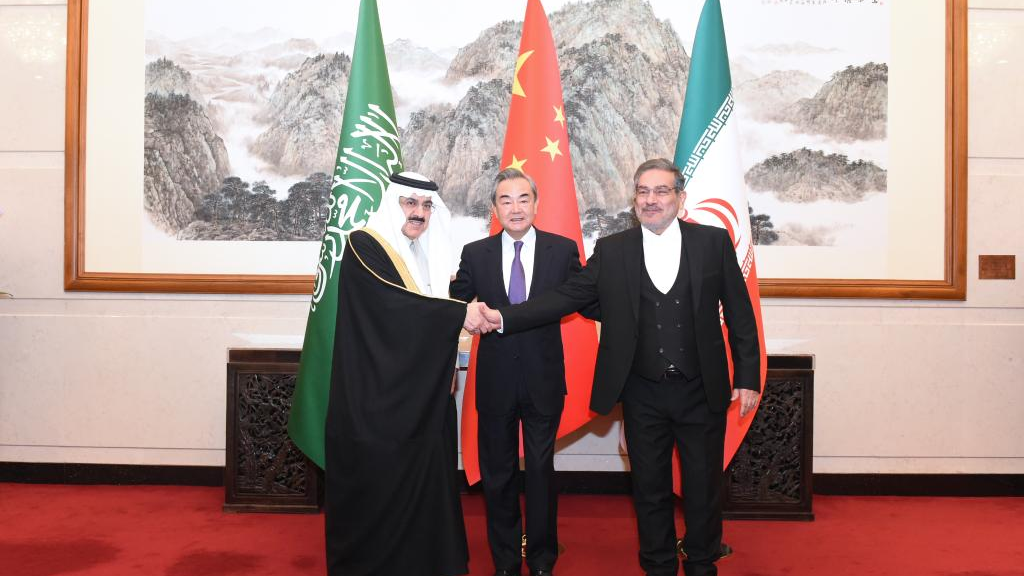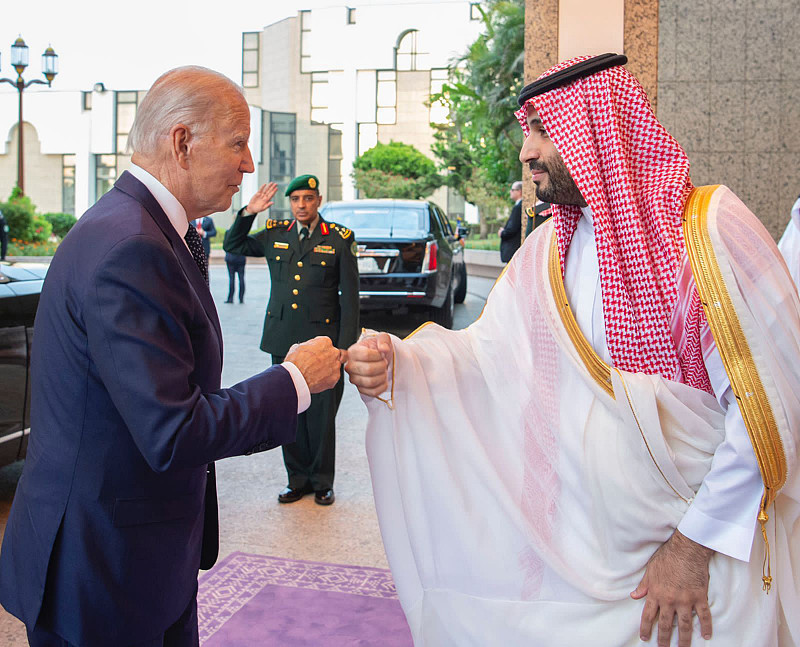
Wang Yi (C), a member of the Political Bureau of the Communist Party of China (CPC) Central Committee and director of the Office of the Foreign Affairs Commission of the CPC Central Committee, attends a closing meeting of the talks between the Saudi delegation led by Musaad bin Mohammed Al-Aiban (L), Saudi Arabia's Minister of State, Member of the Council of Ministers and National Security Advisor, and Iranian delegation led by Admiral Ali Shamkhani (R), Secretary of the Supreme National Security Council of Iran, in Beijing, China, March 10, 2023. /Xinhua
Wang Yi (C), a member of the Political Bureau of the Communist Party of China (CPC) Central Committee and director of the Office of the Foreign Affairs Commission of the CPC Central Committee, attends a closing meeting of the talks between the Saudi delegation led by Musaad bin Mohammed Al-Aiban (L), Saudi Arabia's Minister of State, Member of the Council of Ministers and National Security Advisor, and Iranian delegation led by Admiral Ali Shamkhani (R), Secretary of the Supreme National Security Council of Iran, in Beijing, China, March 10, 2023. /Xinhua
Editor's note: James Lin, research fellow from Global Governance Institution based in Beijing. The article reflects the author's opinion, and not necessarily the views of CGTN.
The sudden move of Saudi Arabia and Iran to reestablish their diplomatic relations makes some Americans raise their eyebrows and grumble about a point conceded to China in the Middle East, an archirival in so called strategic competition. The Wall Street Journal terms this as "jolting the geopolitics of the Middle East." Prominent Republicans like U.S. Senator Lindsey Graham rebukes the kingdom, reminding Saudi Arabia that it remains pegged to the U.S. security protection.
They don't need to have such a bitter reaction, since the rapprochement of the two countries comes from their own decision, not a result of calculation from any other party.
Dialogues between Saudi Arabia and Iran on a potential reconciliation have been undergoing for several rounds in recent years. Worried about a U.S. pullout from Middle East and the protracting Yemen war, Saudi Arabia is eager to secure its nascent process of economic transformation and social transition.
While Iran struggles to ease the pressure from U.S. sanctions and the complaints in the society, Iran's Supreme Leader Ali Khamenei regards the widespread unrest caused by the death of Mahsa Amini, a girl in police custody because of "improperly wearing a hijab," as a hybrid war against the existent of the regime. The political turmoil lingered for over five months across the country and left hundreds of people killed. Both countries come to realize that the breakthrough of their relations may turn out to be the best solution they could have.
Iraq has served as the major mediator in the above talks, although Washington keeps itself in the loop and Beijing remains an advocator of peaceful solutions. It is not a surprise that the deal is finally sealed in China. As former Saudi intelligence chief Turki Al Faisal pointed out, neither the U.S. nor Europe would have been able to be an "honest broker." For long time, Iran has looked to China and Russia for their support. Two years ago, China signed a 25-year cooperation agreement with Iran, committing a heavy investment of $400 billion in exchange of a stable oil supply.
And Saudi Arabia regards China as a strategic partner. The Gulf country becomes more and more dubious about the U.S. security guarantee after its oil facilities were battered by missiles and drones for several times, without getting a kinetic response from the Americans. They may also have lost patience when the U.S. talks the talk in Yemen. And they certainly wouldn't like to give the credit to an administration which ever called the country as a "pariah."
However, Saudi Arabia, like many other countries is not keen on taking a side between the U.S. and China. What really matters is defending their own national interest. Although Saudi officials on many occasions stressed the traditional relationship with the U.S., it didn't join the Western smear campaign against China after the COVID-19 pandemic. It also firmly rejected U.S. request to increase oil production in order to reduce gasoline prices, even after a patronizing visit conducted by Joe Biden.

U.S. President Joe Biden meets with Saudi Crown Prince and Prime Minister Mohammed bin Salman at the Al Salman Royal Palace in Jeddah, Saudi Arabia, July 15, 2022. /CFP
U.S. President Joe Biden meets with Saudi Crown Prince and Prime Minister Mohammed bin Salman at the Al Salman Royal Palace in Jeddah, Saudi Arabia, July 15, 2022. /CFP
The biggest beneficiaries of the Saudi-Iran restoration of relations are the people in the two countries, and broadly speaking those in the Middle East region. Saudi Arabian Foreign Minister Prince Faisal bin Farhan Al Saud twittered: "All the region's countries have a shared destiny and common denominations, which make it necessary for us to share the model of prosperity and stability for our peoples to enjoy it." His counterpart, Iranian Foreign Minister Hossein Amir-Abdollahian echoed and said "the return of normal relationship … provides great capacities to the two countries, the region and the Islamic world."
The most expected dividend from the renewed ties lies with a hope of ending the long war in Yemen which has displaced millions of people and left hundreds of thousands dead. Iranian media outlets have said that the agreement would help in bringing a political settlement between the Houthis and the Sunni government. Though the Houthis claims that they will stick to its own war agenda, not necessarily stay in line with Iran, they practically have reduced the drone attack against Saudi Arabia. The United Arab Emirate will also feel a relief, being another victim of Houthi's missile and drone harassment.
Another area which might find tension being decreased is Iraq. Both Saudi Arabia and Iran try to exert influence on the country. The Iraqi government has been unable to contain belligerent militias such as Kataib Hezbollah, which allies with Iran. With a better understanding between the two regional powers, cross border attack against Saudi Arabia from Hezbollah may not happen again.
The case looks similar in Lebanon where the parliament failed in electing a new consensus president after months of delays, severely intervened by the Iran backed Hezbollah. The Sunni Muslims in the country, accounting about 30 percent of the population, are strongly supported by Saudi Arabia on the other hand. The compromise between the leaders in both the Sunni and Shia camps may bring Lebanon walking out of a political and social predicament.
In the economic aspect, the normalization of the relations of Saudi Arabia and Iran will set free more flows of manpower and goods across the region. The two countries promise to relaunch their trade and investment cooperation concluded in a previous agreement. Other countries in the region also see opportunities.
Having rich resources of oil and natural gas, holding a geographical position in connection with the Caucasus and Central Asia, Iran plays a strategic role in international trade. With the improvement in the regional security environment, more space in economic cooperation is opened up for countries such as Unite Arab Emirates, Oman and Qatar.
A few days ago, Iraq and Iran signed joint MOUs to boost bilateral ties in the fields of transportation, trade, energy, electricity, gas, water and banking financial transactions. Besides, Iran has signed a Memorandum of Obligations to become a full member of the Shanghai Cooperation Organization (SCO). With the upcoming participation of Saudi Arabia and other Gulf countries, a potent and harmonious of economic collaboration is looming on the horizon.
(If you want to contribute and have specific expertise, please contact us at opinions@cgtn.com. Follow @thouse_opinions on Twitter to discover the latest commentaries in the CGTN Opinion Section.)